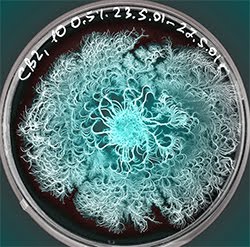|
A new study published this week by the University of California, San Diego’s Center for Theoretical Biological Physics shows that bacteria play games, too.
Using a distinct network of genes and proteins, a colony’s bacteria communicate with each other in an effort to decide whether or not to form spores. A bacterium can respond to external stress by forming a spore, but with a cost: forming spores costs the “life” of the mother cell, but a copy of the DNA is preserved. However, if a bacterium fails to form a spore – in a state of “competence” – and absorbs through its membrane material from the dying cells, the bacterium has a higher chance of “dying” anyways. Thus, a dilemma arises that helps scientists better understand the benefits and detriments of game theory and Prisoner’s Dilemma. Ben Jacob, a fellow of the Center for Theoretical Biological Physics, explains the connection:” Prisoner’s Dilemma for bacteria is [that] each bacterium must decide whether… to cooperate, or escape into competence, or take advantage of the others… each cell has an internal timer whose pace changes according to the stress it experiences… In addition to internal stress, each bacterium adjusts the pace of its timer accordingly to the stress of its peers and their intention to sporulate or to go into competence.” This weighing of risks and benefits applies to human decisions as well. Should we receive the new H1N1 vaccine and face potential side effects, or should we take the risk of not receiving the vaccine? As with bacteria, humans are better off receiving the H1N1 vaccine if most other people do not receive the vaccine; and vice versa. Humans can only do as bacteria do and “adjust… to [their] peers.” GTB
0 Comments
Leave a Reply. |
Categories
All
Archives
April 2024
|

